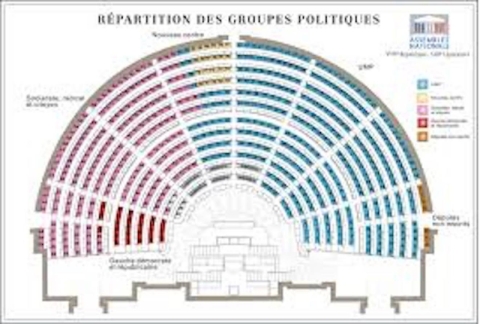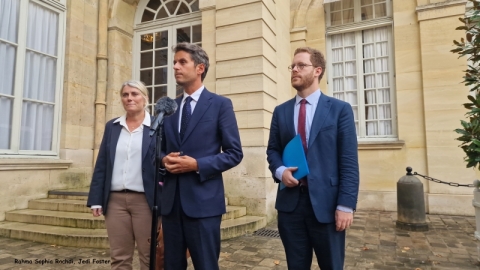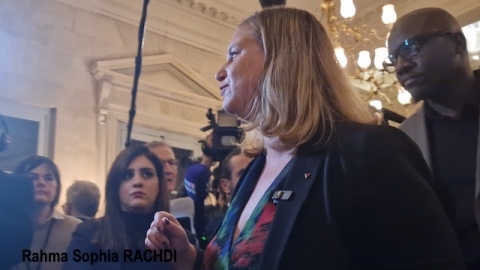Politics
FRENCH PM BAYROU'S GOVERNMENT COLLAPSED AMID ASKING CONFIDENCE VOTE
364 MP OUT OF 573 VOTED AGAINST

French PM Francois Bayrou (Source: Rahma Sophia Rachdi, Jedi Foster)
USPA NEWS -
On September 8, 2025, François Bayrou’s government collapsed to a resounding defeat in the French National Assembly, where 364 deputies voted against his general policy address and only 194 supported it, with 13 abstentions (from the Republicans), and 4 MP who were absent. It is the first government of the 5th Republic, to be ousted by such a vote of confidence in the French history. One of the reasons of the no confidence voted against Francois Bayrou, was triggered by the announcement of sweeping austerity measures, including new taxes and the elimination of two public holidays to save €44 billion, last July. The Prime Minister Bayrou addressed the staggering €3,418 billion national debt, had already drawn fierce criticism across party lines, with many viewing his approach as political suicide.
"FRAGILE REPUBLIC : FRANCE’S 4th PRIME MINISTER IN 18 MONTH BROUGT DOWN BY ECONOMIC & POLITICAL DIVIDE " On September 8, 2025, Prime Minister François Bayrou delivered a dramatic and urgent address before a divided National Assembly “I am standing before you because nothing was preordained. Reality will remain inexorable, spending will continue to rise, and the burden of debt already unbearable will grow heavier and more costly. You have the power to bring down the government, but you do not have the power to erase reality.” Said the Prime Minister Francois Bayrou in his address, at the French National Assembly. He also justified his speech “The greatest risk is not to take any at all, to do nothing and keep political routines. What France needs now is the courage of compromise. Only through collaborative government can we restore stability”…
"A RECORD OF INSTABILITY : BAYROU’S GOVERNMENT FALLS; MACRON FACES BINKMANSHIP AS FARCE SEEKS NEW DIRECTION The drama marks the collapse of France’s fourth government since June 9, 2024, when President Emmanuel Macron dissolved the National Assembly, leaving it fragmented and stripped of any absolute majority, a division unprecedented in modern French politics. As Francois Bayrou submitted his resignation, the president now faces urgent calls from the far left for his own departure and demands from the far right for the Assembly’s dissolution, while centrist voices urge rapid appointment of a “rare pearl” prime minister to steer the country out of crisis.
Complicating the political timetable is the looming national blockade planned for September 10, with 38 or more worker and activist collectives organizing mass strikes, highway blockades, sabotage of traffic cameras, and disruptions to critical infrastructure including transport, hospitals, schools, and cash dispensing machines. Organizers even plan to fill supermarket carts with food staples to be distributed by force, highlighting the depth of public anger and the unprecedented gridlock threatening France’s social and economic stability from July 2025 onward.
MAJOR POLITICAL LEADERS RESPOND TO BAYROU’S GOVERNMENT COLLAPSE
Major poiltical leaders, of their groups at the National Assembly, have mostly expressed their satisfaction of the fall of Francois Bayrou's government, and declared their wisheis for the next steps and orientation. Several centrist and independent groups expressed concern about perpetual government instability and gridlock, with calls for either stability or fresh elections.
• Laurent WAUQUIEZ, Les Republican Group Leader at National Assembly stated : “France Insoumise is the major political danger for the nation,” said Wauquiez, refusing any coalition with far-left parties or alignment with the Nouveau Front Populaire, and calling for a right-leaning stability.
Major poiltical leaders, of their groups at the National Assembly, have mostly expressed their satisfaction of the fall of Francois Bayrou's government, and declared their wisheis for the next steps and orientation. Several centrist and independent groups expressed concern about perpetual government instability and gridlock, with calls for either stability or fresh elections.
• Laurent WAUQUIEZ, Les Republican Group Leader at National Assembly stated : “France Insoumise is the major political danger for the nation,” said Wauquiez, refusing any coalition with far-left parties or alignment with the Nouveau Front Populaire, and calling for a right-leaning stability.
Marine Le Pen (National Rally, RN, Far Right, Group Leader at National Assembly ) stated:
• “This is a moment of truth, exposing decades of disastrous governance. Dissolution of the National Assembly is not an option, it’s an institutional necessity to prevent further gridlock,” Le Pen insisted, evoking De Gaulle but dismissing any resignation from President Macron as likely"
• “This is a moment of truth, exposing decades of disastrous governance. Dissolution of the National Assembly is not an option, it’s an institutional necessity to prevent further gridlock,” Le Pen insisted, evoking De Gaulle but dismissing any resignation from President Macron as likely"
Boris Vallaud (Socialist Party, PS, Group Leader at national Assembly ) :
• Vallaud called for a left-wing government and said, “We are ready. Let him come for us,” directly addressing Macron and calling for progressive change
• Vallaud called for a left-wing government and said, “We are ready. Let him come for us,” directly addressing Macron and calling for progressive change
Gabriel Attal (Ensemble pour la République, EPR, Macron's Party):
• Gabirel Attal called for “stability, the courage of compromise,” warning that “it isn’t for the French to solve the Parliament’s problems, but for Parliament to solve the problems of the French.” He proposed a new, more inclusive model for the political system, focused on pragmatic governance, based on political programs compromises
• Gabirel Attal called for “stability, the courage of compromise,” warning that “it isn’t for the French to solve the Parliament’s problems, but for Parliament to solve the problems of the French.” He proposed a new, more inclusive model for the political system, focused on pragmatic governance, based on political programs compromises
Mathilde Panot (La France Insoumise, LFI, Far Left Group Leader at National Assembly):
• Mathilde Panot denounced Bayrou as “the last face of an illegitimate, obstinate policy, incapable of garnering any genuine support... Macronism governs only by fear.”
• Mathilde Panot denounced Bayrou as “the last face of an illegitimate, obstinate policy, incapable of garnering any genuine support... Macronism governs only by fear.”
Cyrielle Chevallier (Ecologists, the Greens Group Leader National Assembly):
• Cyrielle Chevallier welcomed Bayrou’s departure as a relief but expressed concern about the aftermath, calling for genuine change and hoping for a left-wing successor
• Cyrielle Chevallier welcomed Bayrou’s departure as a relief but expressed concern about the aftermath, calling for genuine change and hoping for a left-wing successor
"FROM HOPE TO HISTORY: FRANCOIS BAYROU’S BRIEF TENURE ENDS AS NATIONAL ASSEMBLY REJECTS AUSTERITY " On September 8, 2025, Prime Minister François Bayrou delivered a dramatic and urgent address before a divided National Assembly:
“France’s condition is critically threatened. France’s pronostic vital is engaged, the equivalent of being in intensive care. We stand at a crossroads where nothing is written and all hope requires action.” he said. Francois Bayrou also declared “I am standing before you because nothing was preordained. Reality will remain inexorable, spending will continue to rise, and the burden of debt—already unbearable will grow heavier and more costly. You have the power to bring down the government, but you do not have the power to erase reality.” PM Bayrou declared also “The greatest risk is not to take any at all, to do nothing and keep political routines. What France needs now is the courage of compromise. Only through collaborative government can we restore stability.”
“France’s condition is critically threatened. France’s pronostic vital is engaged, the equivalent of being in intensive care. We stand at a crossroads where nothing is written and all hope requires action.” he said. Francois Bayrou also declared “I am standing before you because nothing was preordained. Reality will remain inexorable, spending will continue to rise, and the burden of debt—already unbearable will grow heavier and more costly. You have the power to bring down the government, but you do not have the power to erase reality.” PM Bayrou declared also “The greatest risk is not to take any at all, to do nothing and keep political routines. What France needs now is the courage of compromise. Only through collaborative government can we restore stability.”
According to an IFOP poll reported in early September, 70% of French citizens approved the no-confidence vote against Bayrou’s government, favoring a change in leadership and greater parliamentary inclusiveness. Only 18% expressed confidence that Macron’s next appointee would resolve the crisis, while a rising share (53%) preferred new elections.
CONSEQUENCES & POST RESIGNATION SCENARIOS
Emmanuel Macron’s Response ws verty expected, and rumors said that the head of states may address Remarks to the french people:
President Macron acknowledged Bayrou’s government failure and promised to appoint a new Prime Minister “in the coming days,” but immediately ruled out a snap election, stressing the need for “state continuity and public service.”
Emmanuel Macron’s Response ws verty expected, and rumors said that the head of states may address Remarks to the french people:
President Macron acknowledged Bayrou’s government failure and promised to appoint a new Prime Minister “in the coming days,” but immediately ruled out a snap election, stressing the need for “state continuity and public service.”
Jean-Luc Melenchon (leader of LFI, far left. ), demanded the resignation of the President Macron, claiming only a complete overhaul including Macron’s departure could end the chaos and restore democratic legitimacy.
Marine Le Pen (Far Right Leader of RN), called for dissolution of the National Assembly as a “democratic tool to break deadlocks and clarify the political situation,” insisting that France’s institutions require renewal.
Gabriel Attal (Central leader EPR, Macron's party) Argued in favor of changing the current political model, advocating for stability and compromise through a reconfigured parliamentary coalition or broader cross-party agreements
THE THREE PATHS FORWARD
1. Presidential Appointment: Macron may appoint a new Prime Minister, seeking a technocratic or centrist (EPR) solution to preserve stability though this risks further deadlock.
2. Dissolution and New Elections: Demanded by Le Pen and others, this option could resolve gridlock or lead to further polarization.
3. Systemic Reform: Advocated by Attal, this would require a comprehensive rethinking of the parliamentary and presidential relationship potentially through new coalition agreements or constitutional reform.
1. Presidential Appointment: Macron may appoint a new Prime Minister, seeking a technocratic or centrist (EPR) solution to preserve stability though this risks further deadlock.
2. Dissolution and New Elections: Demanded by Le Pen and others, this option could resolve gridlock or lead to further polarization.
3. Systemic Reform: Advocated by Attal, this would require a comprehensive rethinking of the parliamentary and presidential relationship potentially through new coalition agreements or constitutional reform.
Liability for this article lies with the author, who also holds the copyright. Editorial content from USPA may be quoted on other websites as long as the quote comprises no more than 5% of the entire text, is marked as such and the source is named (via hyperlink).










